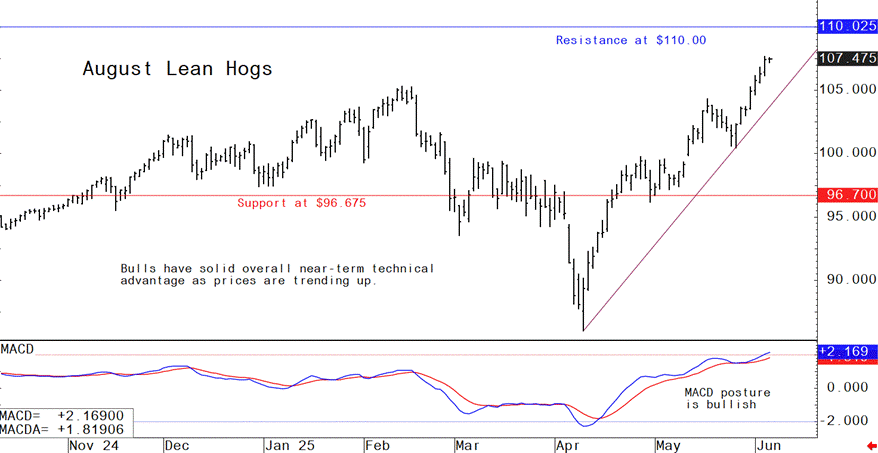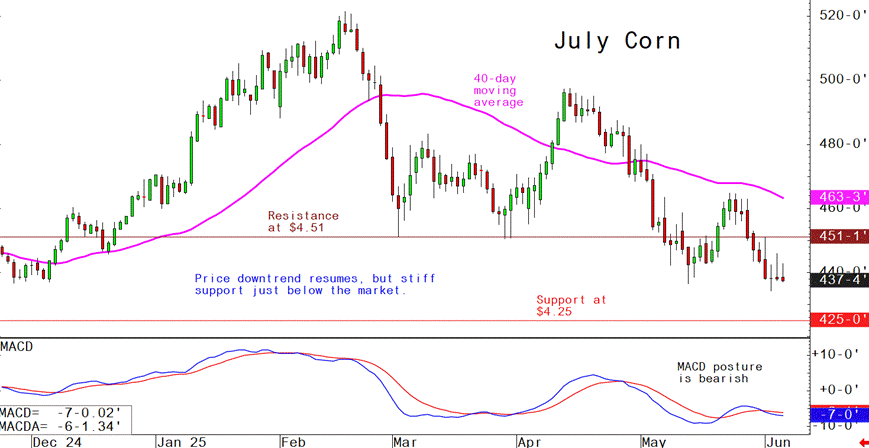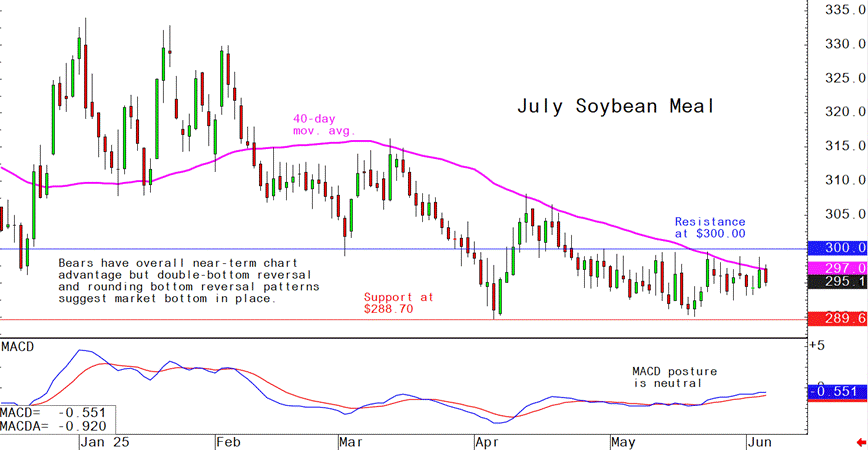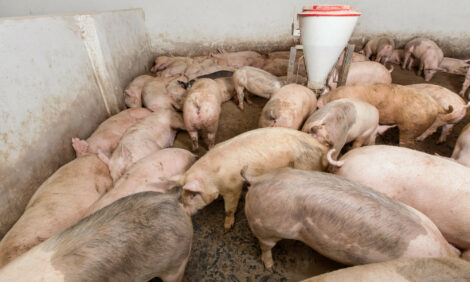



Pig outlook: Lean hog futures bulls are charging
Livestock analyst Jim Wyckoff reports on global pig newsAugust lean hog futures prices this week hit a contract high and the bulls have the solid near-term technical advantage. The path of least resistance for prices remains sideways to higher. Cash hot and fresh pork market fundamentals remain solid. The latest CME lean hog index is up another 41 cents to $96.75 as of June 3. Hog futures traders anticipate the seasonal rally in prices will persist into late summer.
Weekly USDA US pork export sales
Pork: Net sales of 36,400 MT for 2025 were up 19 percent from the previous week and 25 percent from the prior 4-week average. Increases primarily for China (12,700 MT, including decreases of 200 MT), Mexico (12,000 MT, including decreases of 300 MT), Japan (3,000 MT, including decreases of 100 MT), South Korea (1,800 MT, including decreases of 100 MT), and Canada (1,600 MT, including decreases of 300 MT), were offset by reductions for Nicaragua (200 MT). Exports of 24,100 MT were down 17 percent from the previous week and 12 percent from the prior 4-week average. The destinations were primarily to Mexico (10,500 MT), Japan (3,400 MT), South Korea (2,800 MT), China (1,800 MT), and Colombia (1,300 MT).
JBS unveils $135 million sausage plant in Perry, Iowa
Facility to create over 700 jobs, revitalize community after Tyson closure
JBS USA announced plans to construct a $135 million sausage production facility in Perry, Iowa, aiming to create over 700 jobs and revitalize the local economy following the closure of a Tyson Foods pork plant in 2024, according to the Iowa Capital Dispatch.
Details of the project
- Investment and capacity: The facility will process approximately 500,000 sows annually, producing around 130 million pounds of sausage.
- Job creation: The project is expected to generate over 700 jobs, including 500 direct positions and approximately 250 construction jobs during the building phase.
- Timeline: Construction is slated to begin in the fall of 2025, with operations commencing in late 2026.
- Community impact: The initiative is seen as a significant boost for Perry, a town of about 8,000 residents, especially after the loss of nearly 1,300 jobs due to the Tyson plant closure.
- Strategic shift: JBS; move reflects a strategic pivot towards the domestic market in response to challenges in pork exports, particularly due to retaliatory tariffs from countries like China .
Perry Mayor Dirk Cavanaugh described the project as a "potential game-changer" for the community, highlighting the anticipated long-term benefits for local schools, infrastructure, and businesses.
Cameron Bruett, JBS head of corporate affairs, emphasized the facility’s state-of-the-art design, noting it would be the first of its kind built in the U.S. in the last 40 years. He also mentioned that starting wages are expected to be comparable to other JBS facilities in Iowa, around $22 per hour.
The Iowa Pork Producers Association welcomed the development, citing the enhanced opportunities for local pork producers and the strengthening of Iowa’s leadership in pork production.
Additionally, JBS plans to invest in community programs such as "Hometown Strong" and "Better Futures," which focus on local development projects and educational support for employees and their families .
The facility’s proposed location on the southeast side of Perry requires a zoning change from agricultural to heavy industrial, pending approval by the city council.
Texas Bill Could Force Warning Labels on Doritos, M&Ms and More
Kennedy-backed food additive crackdown faces industry backlash as Abbott weighs final decision
A sweeping Texas bill, Senate Bill 25, would require new warning labels starting in 2027 on popular foods like Skittles, Mountain Dew, Froot Loops and Doritos — flagging ingredients banned or discouraged by other countries as “not recommended for human consumption.”
Backed by HHS Secretary Robert F. Kennedy Jr., the measure is awaiting Governor Greg Abbott’s signature and would impact over 40 ingredients, including synthetic dyes, titanium dioxide, bleached flour, and preservatives like BHT and BHA. Food brands and retailers including PepsiCo, Mondelez, Coca-Cola, Walmart, and the Texas Retailers Association have pushed back, warning it will cause widespread confusion and higher costs.
Quote of note: “He will go down as a historical figure as the man who broke the food industry’s back on these chemicals,” said activist Vani Hari, a leading backer of the bill.
While the bill includes a federal carve-out — allowing FDA or USDA rulings to override state labels — Kennedy’s agencies have yet to officially designate the flagged ingredients as safe. Warning labels would appear in bold text on packaging sold in Texas unless federal action supersedes.
Industry critics argue the bill ignores U.S. science-based standards. “The ingredients used in the U.S. food supply are safe,” said John Hewitt of the Consumer Brands Association. “SB 25 mandates inaccurate warning language… and drives consumer confusion and higher costs.”
Governor Abbott has 20 days from the end of session to sign or veto the bill.
India’s edible oils imports surge in May, led by palm oil
India’s palm oil imports in May surged 87% from April to a six-month high of 600,000 MT, as lower inventories and a price discount to rival soyoil and sunflower oil prompted refiners to increase purchases. Soyoil imports rose 10% to 398,000 MT and sunflower oil imports increased 2% to 184,000 MT.
WOAH declares Brazil free of FMD
Brazil has been recognized by the World Organization for Animal Health (WOAH) as a country free of foot-and-mouth disease without vaccination. Meatpacking association Abrafrigo called it a “historic moment” for Brazil’s beef industry after decades of actively promoting vaccination and health controls in livestock. The new health certification positions the country “at a new level in international trade” and could help open up “highly demanding” markets, such as Japan, to Brazilian beef, said the Brazilian Association of Meat Exporters (Abiec). With the new status, the Brazilian government will need to renegotiate several international health certificates.
The next week’s likely high-low price trading ranges:
August lean hog futures--$105.00 to $110.00 and with a sideways-higher bias
July soybean meal futures--$289.70 to $308.10, and with a sideways bias
July corn futures--$4.30 to $4.65 and a sideways bias
Latest analytical daily charts lean hog, soybean meal and corn futures












